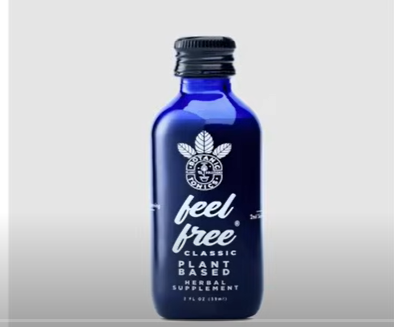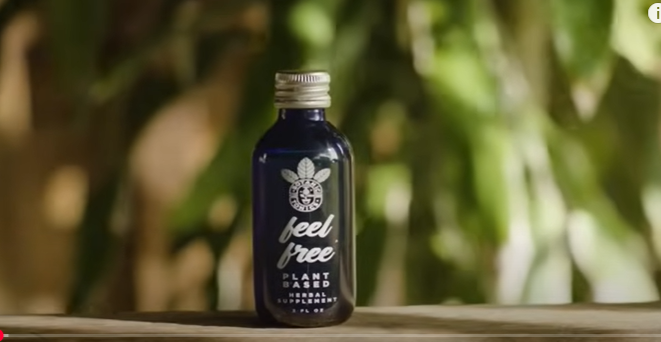What Are Feel Free Drinks – Helpful or Harmful?
When people ask, “What are Feel Free drinks?” they’re usually curious about a wellness beverage that has sparked both interest and concern across the health community. Feel Free drinks are marketed as natural wellness tonics that promise to boost focus, productivity, and relaxation without alcohol.

What are Feel Free Drinks?
However, these beverages contain ingredients that have raised serious safety questions among health experts and users alike. If you really want to know what are feel free drinks you are in the right place at the right time. Here we go.
They’re liquid supplements created by Botanic Tonics, a Santa Monica-based company that promotes these beverages as healthy alternatives to alcohol. The drinks contain a blend of botanical ingredients, with kava and kratom being the primary active components. While marketing presents these as harmless wellness products, the reality tells a more complex story that every consumer should understand before trying them.
The Company Behind Feel Free Drinks
Botanic Tonics markets Feel Free as a “feel-good wellness drink” and positions it as a “safe, sober, and healthy alternative to alcohol.” The company targets health-conscious consumers who want to reduce their alcohol intake while still enjoying social beverages. However, the ingredients in these drinks have sparked debates about their safety and potential for addiction.
Key Ingredients in Feel Free Drinks
Kava: The Relaxation Root
Kava comes from a plant native to the Pacific Islands and has been used traditionally for centuries. This ingredient can produce feelings of relaxation and mild euphoria. While kava is legal in the United States, it can cause drowsiness and affect coordination. Some studies have also linked kava to liver problems when used regularly.
Kratom: The Controversial Component
Kratom is the ingredient that has caused the most concern among health experts. This herb contains compounds called 7-hydroxy mitragynine and mitragynine, which affect the same brain receptors as opioids like morphine. The FDA has issued warnings about kratom, stating that it can be addictive and potentially dangerous. This ingredient is what makes Feel Free drinks particularly controversial in the wellness community.
The Feel Free Lawsuit and Safety Concerns
Real User Experiences Gone Wrong
The safety concerns about Feel Free drinks became public when Romulo Torres filed a lawsuit against Botanic Tonics. Torres claimed that consuming Feel Free led to two hospitalizations within a year due to the high concentration of kratom in the beverage. According to his lawsuit, he became addicted to the product and experienced severe withdrawal symptoms when trying to quit.
Torres’ experience highlights a serious problem: many users don’t realize they’re consuming a substance with opioid-like effects. When he tried to stop drinking Feel Free, the withdrawal symptoms were so severe that he returned to drinking alcohol, a substance he had previously struggled with. This case shows how Feel Free drinks can potentially interfere with recovery and sobriety efforts.
Celebrity Experiences and Public Awareness
Rob McElhenney, star and co-creator of “It’s Always Sunny in Philadelphia,” shared his experience with Feel Free on The Always Sunny Podcast. He initially thought it was an energy drink, but quickly realized “it just makes you high.” McElhenney doubled the recommended dosage when the initial effects weren’t strong enough and eventually switched back to alcohol.
His story resonates with many users who underestimate the potency of these drinks. The celebrity’s candid discussion helped bring attention to the potential risks and encouraged others to share their experiences online.

FDA Position on Kratom
The Food and Drug Administration has issued clear warnings about kratom, the main active ingredient in Feel Free drinks. The FDA states that kratom:
- Affects the same opioid brain receptors as morphine
- Has potential for abuse and addiction
- Can cause serious side effects, including seizures and liver damage
- May interact dangerously with other medications
Health Risks and Side Effects
Short-Term Effects
Users of Feel Free drinks may experience immediate effects, including:
- Drowsiness and fatigue
- Nausea and stomach upset
- Dizziness and confusion
- Changes in heart rate
- Difficulty concentrating
These effects can be hazardous when driving or operating machinery. The unpredictable nature of these symptoms makes it difficult for users to plan their day safely.
Long-Term Health Concerns
Regular consumption of Feel Free drinks may lead to more serious health problems over time. The kratom content can cause physical dependence, meaning your body adapts to the substance and requires it to function normally. Users have reported needing increasing amounts to achieve the same effects, which is a classic sign of developing tolerance and potential addiction.
The liver damage associated with kava is another long-term concern that users should consider. While not everyone experiences liver problems, the risk increases with regular use and higher doses.
Withdrawal and Dependence Issues
Many Feel Free users report experiencing withdrawal symptoms when they try to stop consuming the drinks. These symptoms can include:
- Severe anxiety and irritability
- Physical discomfort and pain
- Sleep disturbances
- Intense cravings for the product
- Depression and mood swings
The withdrawal process can be so uncomfortable that some users, like Torres in the lawsuit, return to alcohol or other substances to cope with the symptoms.
Regulatory Status and Legal Concerns
Current Legal Status
Feel Free drinks exist in a regulatory gray area. While kratom is legal in most U.S. states, several states have banned or restricted its use. The drinks are supposedly dietary supplements, which means they don’t undergo the same rigorous testing and approval process as prescription medications.This lack of oversight means consumers can’t be sure about the exact amounts of active ingredients in each bottle or whether the products are consistent. The quality control standards for dietary supplements are much lower than those for medications.
Industry Response to Concerns
Botanic Tonics has defended their products, stating that Feel Free drinks are “safe and manufactured, marketed, and distributed to the highest industry standards.” The company claims to conduct third-party laboratory testing and follow FDA-reasonable manufacturing requirements for dietary supplements.
However, critics argue that these standards aren’t sufficient for products containing psychoactive substances like kratom. The ongoing lawsuit and user reports suggest that current safety measures may not adequately protect consumers from potential harm.
Safer Alternatives for Wellness and Relaxation
Natural Stress Relief Options
For those seeking natural ways to relax and improve wellness without the risks associated with Feel Free drinks, consider these evidence-based alternatives:
Herbal Teas: Chamomile, passionflower, and lemon balm teas can promote relaxation without psychoactive effects. These options have long histories of safe use and don’t carry addiction risks.
Meditation and Mindfulness: Regular meditation practice can reduce stress and anxiety naturally. Apps and online resources make it easy to start a meditation routine that fits your schedule.
Exercise and Movement: Physical activity releases natural feel-good chemicals in your brain called endorphins. Even a short walk can improve mood and reduce stress levels.
Professional Support for Substance Use Concerns
If you’re using Feel Free drinks to cope with stress, anxiety, or as an alcohol substitute, consider speaking with a healthcare provider. They can help you develop safer strategies for managing these concerns and provide support if you’re experiencing dependence on any substance.
Frequently Asked Questions About Feel Free Drinks
Are Feel Free drinks addictive?
Yes, Feel Free drinks can be addictive due to their kratom content. Kratom affects opioid receptors in the brain, which can lead to physical dependence and addiction. Many users report experiencing withdrawal symptoms when trying to stop consumption, and some require professional help to quit safely.
Are Feel Free drinks safe to consume?
While marketed as safe, Feel Free drinks carry significant risks. The FDA has warned against kratom consumption due to its potential for addiction, liver damage, and dangerous interactions with other substances. Unlike medications, the drinks have no regulation. Therefore, quality and consistency can vary between batches.
Do Feel Free drinks contain opiates?
Feel Free drinks don’t contain traditional opiates, but they do contain kratom, which has opioid-like effects. The compounds in kratom affect the same brain receptors as morphine and other opioids, which explains why users can experience similar addiction and withdrawal patterns.
Are Feel Free drinks regulated by the FDA?
No, Feel Free drinks are not directly regulated by the FDA. They’re dietary supplements, which have much looser oversight than prescription medications. While the FDA has issued warnings about kratom, it cannot prevent its sale in supplement form in most states.
Do Feel Free drinks pose problems for young people?
Yes, Feel Free drinks can be particularly dangerous for young people. Developing brains are more susceptible to addiction, and young people may not recognize thesigns of dependence. The marketing of these products as “wellness drinks” can make them seem safer than they are to inexperienced users.
How do Feel Free drinks affect circadian rhythms and sleep?
Feel Free drinks can disrupt standard sleep patterns due to their psychoactive ingredients. Kratom can cause both sedation and stimulation depending on the dose, making it difficult to maintain consistent sleep schedules. Regular use may interfere with your body’s natural circadian rhythms, leading to long-term sleep problems even after stopping consumption.
What should I do if I think I’m dependent on Feel Free drinks?
If you’re experiencing withdrawal symptoms when not consuming Feel Free drinks, or if you find yourself needing increasing amounts to feel normal, seek professional help. Healthcare providers can assess your situation and provide safe, medically supervised support for reducing or stopping consumption. Don’t attempt to quit abruptly without medical guidance, as withdrawal can be dangerous.
Making Informed Decisions About Wellness Products
The Feel Free drinks controversy serves as an essential reminder to research any wellness product thoroughly before consumption. While the desire to improve health and find natural alternatives to alcohol is understandable, it’s crucial to understand what you’re putting into your body and the potential consequences.
Before trying any new wellness product, especially one containing psychoactive ingredients, consider consulting with a healthcare provider. They can help you weigh the potential benefits against the risks and suggest safer alternatives that align with your health goals.
Remember that truly safe wellness practices focus on proven methods like proper nutrition, regular exercise, adequate sleep, and stress management techniques. These approaches may take more time and effort than drinking a wellness tonic, but they provide lasting benefits without the risk of addiction or serious side effects.
The ongoing legal battles and user experiences with Feel Free drinks highlight the importance of regulatory oversight for products containing powerful botanical ingredients. Until better safety standards are in place, consumers must take responsibility for thoroughly researching and carefully considering the risks of any wellness product they choose to try.
References
What Are Sober Cocktails? 6 Things To Know About Them. https://curlytales.com/web-stories/what-are-sober-cocktails-things-to-know-about-them/
Santé Blends Original | Calming Powdered Supplement With A Buzz. https://santeblends.com/products/sante-blends-original
December 31, 2023 – Latest News | Latest Headlines Around the World. http://biggboss14episode.com/2023/12/31/
(2018). United States: FDA orders mandatory recall for kratom products due to risk of salmonella. MENA Report, ().
Rolling Safety First: Understanding The Risks Associated With Weed Joints. https://sportsnewsglobe.com/2023/06/25/rolling-safety-first-understanding-the-risks-associated-with-weed-joints
Testosterone Boosters: Benefits & Guide to Choosing Wisely | Hydrafuel – WishNew Wellness. https://wishnew.store/blogs/news/wishnew-store-blog-testosterone-boosters-guide-benefits-ingredients
Mulungu: The Natural Elixir for Peaceful Nights and Stress-Free Days. https://www.entheogenicemporium.com/post/mulungu-the-natural-elixir-for-peaceful-nights-and-stress-free-days
Biohacking Your Way to Peak Performance: Tips and Techniques for Optimal Health. https://www.thenewzthing.com/biohacking-your-way-to-peak-performance-tips-and-techniques-for-optimal-health
Hobbies to Try Instead of Doom Scrolling. https://www.ourmuuz.com/post/hobbies-to-try-instead-of-doom-scrolling
Is Flavored Hookah (Shisha) Harmful to Your Body? – Public Health. https://www.publichealth.com.ng/is-flavoured-hookah-shisha-harmful-to-your-body/
Discover the Medications that Lead to Weight Gain – The Hidden Traps of Common Prescriptions. https://www.tampabayrestorativemedicine.com/post/discover-the-medications-that-lead-to-weight-gain-the-hidden-traps-of-common-prescriptions
The Blue Gene Health Team
(w) mybluegenes.com
Title Page Separator Site title
(email) rachele@mybluegenes.com



